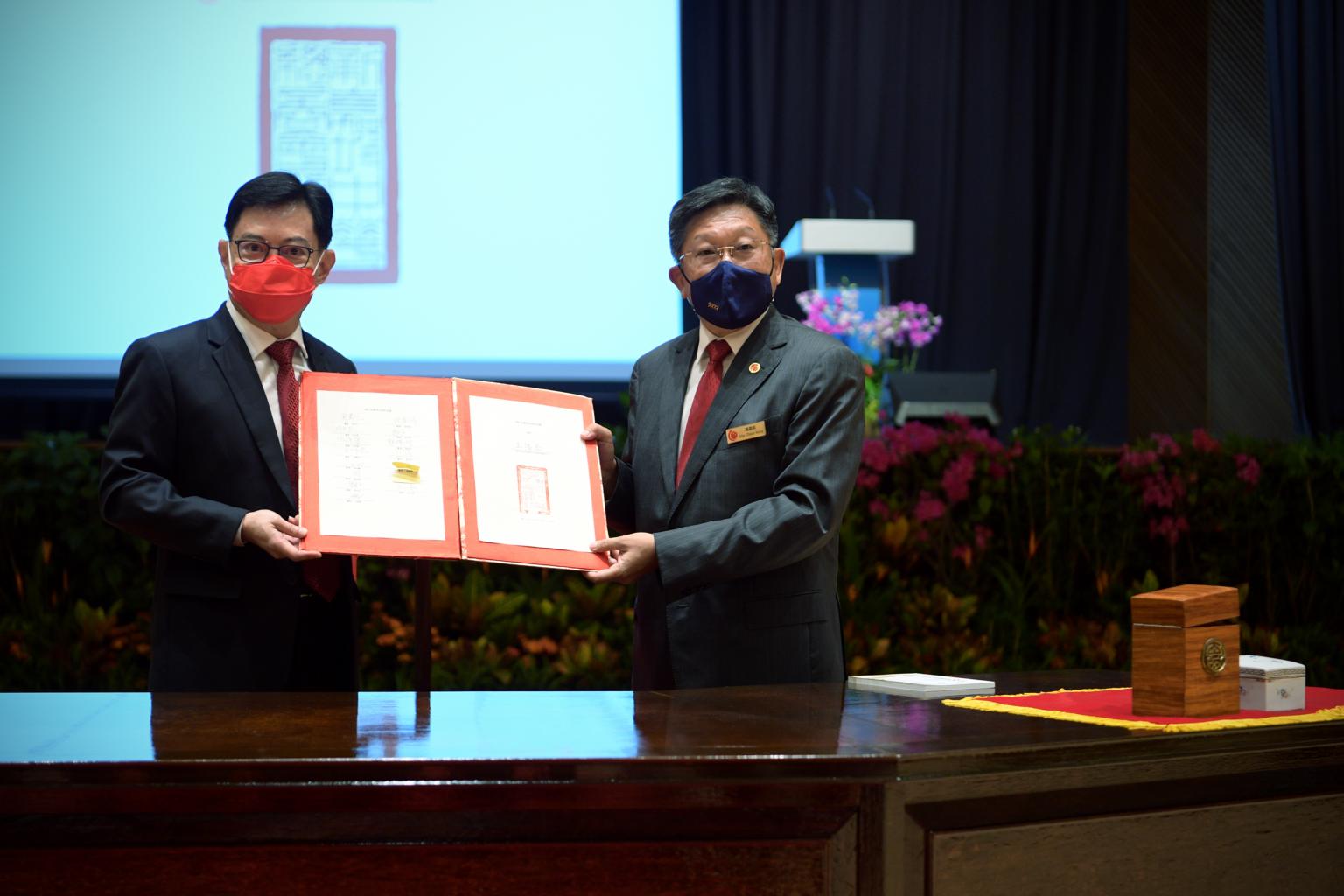SCCCI has been responsive partner for Government in times of crisis: DPM Heng
Sign up now: Get ST's newsletters delivered to your inbox

Deputy Prime Minister Heng Swee Keat (left) with SCCCI's new president Kho Choon Keng at SCCCI's 61st council installation ceremony.
ST PHOTO: NG SOR LUAN
SINGAPORE - The Singapore Chinese Chamber of Commerce and Industry (SCCCI) has been a responsive partner for the Government in times of crisis like the Covid-19 pandemic, said Deputy Prime Minister Heng Swee Keat.
As Singapore recovers from the pandemic but grapples with global uncertainty, SCCCI can continue to play two other key roles: to be a dynamic enabler for transformation and a passionate advocate for Singapore's way of life.
Mr Heng, who is also the Coordinating Minister for Economic Policies, was speaking at SCCCI's 61st council installation ceremony at the Trade Association Hub auditorium on Tuesday (March 15).
Mr Kho Choon Keng, 63, who is Lian Huat Group's executive chairman, was sworn in as the chamber's new president, taking over from Tat Hong chief executive officer Roland Ng, 69.
DPM Heng noted how SCCCI tapped into its global networks to source for disposable masks and other protective equipment to alleviate the severe supply crunch early in the pandemic.
It also provided regular feedback to the Government which was useful in designing policies to help businesses tide over the crisis.
He urged the chamber to continue its role as a responsive partner in times of crisis, with challenges like the ongoing armed conflict in Ukraine adding to the uncertainty.
"Covid will eventually pass, but the world has changed. The digital revolution has been accelerated by the pandemic. There is also now a much stronger emphasis on environmental sustainability, as well as the resilience of supply chains," Mr Heng said, adding that businesses that are able to respond to these new trends will thrive.
As a dynamic enabler for transformation, SCCCI set up live streaming studio facilities last year to help members tap into the digital economy, in collaboration with the Malay and Indian chambers. It also helped small and medium-sized enterprises (SMEs) to go digital.
Besides setting up three new offices in China, it started the Singapore Import Pavilion there to help Singapore brands and products expand into China using e-commerce platforms. The pavilion currently showcases 200 products from 35 Singapore brands.
DPM Heng said that the industry transformation map is a national effort that brings together the work of the Government, union and industry. Beyond the tripartite approach, he urged businesses to build new capabilities and work together better to solve common challenges.
To this end, SCCCI has enabled trade associations and chambers (TACs) to work together through the Trade Association Hub set up in 2017. It houses more than 40 TACs today.
DPM Heng said that SCCCI, a 116-year-old association, has a deep appreciation of Singapore's history, and has kept this alive by helping younger Singaporeans appreciate the past.
This is done through projects like the new virtual heritage trail of Hill Street and the online exhibition to commemorate the 80th anniversary of the fall of Singapore last month. It also helps preserve Chinese culture and heritage while strengthening the multicultural fabric with events like the annual River Hongbao, and scholarships to deserving students of all races.
There is also regular inter-chamber networking events with the Malay and Indian chamber counterparts. He urged SCCCI to continue its role as a passionate advocate for Singapore's way of life.
Mr Kho, who will be leading the chamber over the next three years, said that it will deepen its role as a hub to local businesses as the global environment becomes increasingly volatile.
He outlined four key areas for it going forward: First, to strengthen communication and collaboration between SCCCI, its members and the Government. It will convey the business community's feedback in a timely manner while relaying the objectives of government policies.
Second, it will help businesses venture overseas and create new value for its members, who can leverage its vast resources and wide network to seize business opportunities.
Third, it will also help SMEs digitalise and transform. Together with trade associations, professional organisations and institutes of learning, it will support businesses to upskill and develop their competitiveness.
Its fourth goal is to help SMEs build sustainability capabilities to capture prospects in the green economy.
The 61st council consists of 56 members: 38 people representing corporate or individual members, 17 individuals representing trade association members, and the immediate past president.
Established in 1906, the SCCCI has a membership network of 5,000 corporate members and more than 160 trade association members, representing over 40,000 companies.


